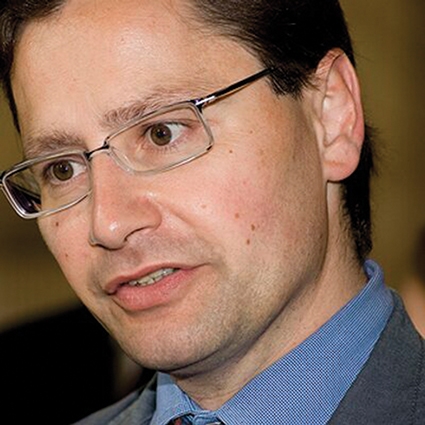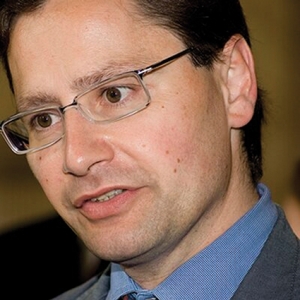Dr. Brivati on Human Rights in Georgia: “Master the Process or it Will Master You”
Addressing a full room, Dr. Brian Brivati advised his audience to “Master the process or it will master you” as he presented research into public policy responses in other countries towards past human rights violations. Based on “Facing the Past: Learning from Shared Experiences,” written by Jenny Munro, the report explored five country contexts and how countries have transitioned from periods of injustice to strengthen democratic processes and how this may apply to the situation in Georgia.
Dr. Brivati was part of a team of UK experts, hosted by the Business and Economic Center, that visited Tbilisi last week to discuss Georgia’s state policy towards past injustices.
Drawing heavily on his experience in Iraq, Dr. Brivati explained processes used there to respond to massive abuses of human rights. “Is anything in their process of national reconciliation, in this truth seeking, useful to Georgia?” he asked.
The architecture of transitional justice
Dr. Brivati returned to the mastering of the past by first considering what is to be achieved. “Decide from the beginning what success should look like.” Lustration, the process of cleansing or purifying something, Dr. Brivati suggests, could be used to explore of the past of the judiciary system to determine if its actions were motivated by ideology or law.
Citing Karl Jaspers, Dr. Brivati outlined the various categories of guilt, some of which could be considered “collective guilt.” In the case of post-war Germany, Jaspers believed that Germany would be renewed by Germans coming to terms with their guilt by talking about it. Seizing on Jasper’s ideas of collective guilt, the Allies had allowed the process of de-nazification in West Germany to end quickly, allowing them to rehire former bureaucrats who had been Nazis to occupy positions in the post-war government.
Our evolving understanding of guilt
According to Dr. Brivati, the “drivers” behind our evolving understanding of guilt began with the rise of victims in changing the terms of the debate. After Hannah Arendt’s “Eichmann in Jerusalem” appeared as a critique of Jasper’s position, intense interest in the experience of the victims was generated, eventually leading to greater understanding, following regime change, of the need to assess political guilt and the actions of public servants against the good they do in the world.
Heavily influenced by truth and reconciliation commissions and the politics of apologies for previous crimes, well-intentioned notions that public discussions between victims and perpetrators could somehow transcend crimes and people could move forward came together in the 2001 Durban World Conference against Racism (WCAR).
According to Dr. Brivati, this led to the Transitional Justice Movement, based on six elements: discover the truth about a period of collective violence or systemic injustice, recognize and validate victims’ suffering, provide compensation for those affected both materially and symbolically, contribute to an inclusive and future-oriented collective memory, prevent new acts of violence, and seek justice in judgment or punishment or both. These elements promote reconciliation and an increase in the values of tolerance and justice.
Here, Dr. Brivati emphasizes, we must return to the question of what we want and what success looks like. He suggests that the first challenge would be to define a common narrative as an agreement by everyone of what has gone wrong.
The second challenge is to overcome ideas of revenge and negative emotions of anger and fear and build trust and forgiveness, thereby fostering tolerance and universal justice.
Where are we in Georgia? The case for doing nothing
Dr Brivati suggests that there is a very strong political argument for doing nothing in Georgia. This, in his view, is a denial of collective trauma, the rights of victims and the fact that some institutions in Georgia failed. In successful democratic processes, consolidation occurs when groups opt in to participate over the long term, believing that their rights are better protected if they are a part of the system. With government changes, the challenge is then to get groups to stay in the system, rather than opting out. This is done by building trust in institutions and separating those who have committed crimes from those who are not a part of the same movement or government. It is also important, he added, that people are always invited into the process and never to exclude any part of the political group.
To get groups to opt in to the political process, he explained, we must not deny failures but by looking straight at them and by doing so the suggestion of impunity, that is, the idea that anybody can commit a crime without having to face up to it, is removed. So if there appear to be cases of institutional failures in the Georgian system over the last two decades, he suggested, then there are strong arguments for examining them.
To do this, he explained, four things must first be in place. First, he emphasized repeatedly, the examination must be taken out of present politics. If this is done successfully faith in the judiciary and in the political process and institutions can be restored, thereby also strengthening the likelihood of foreign investments and economic improvements. Second, an “elite bargain” must be made; those who have abused the system must be isolated. Third, there must be openness in the system and an institutional openness to change. Fourth, there must be an acknowledgment of guilt to transcend institutional failure and implement transitional justice. From those who have abused the system, there must be an acknowledgement that the system was broken and things went too far and there was abuse. This may be symbolic, suggests Dr. Brivati, but it is necessary.
Ms. Munro explained the comparative research that informed their examination while emphasizing that the cases they studied are not like Georgia, but are only to be used as examples to hopefully move forward. In her comments Ms. Munro emphasized there is only the Georgian way and that the participation of the public and politicians is necessary; judgement is not derived from punishment and justice may be outside of the courts.
“This is too important to be left to politicians.”
Clarifying his understanding of institutional failures in the judiciary in Georgia in the past twenty years that needed to be addressed, Dr. Brivati cited opinion polls indicating that the majority of people would not vote for any of the political parties. Additionally, he noted, the figures for people in prison and alleged excessive use of force by law enforcement officers, among other incidents, indicated to him that there had been significant institutional failures in the judiciary and that cynicism and lack of belief by the electorate in the independence of the judiciary justified a more systemic examination and reformation of the judiciary. The challenge here, he reiterated, is to take this inquiry out of the hands of present politics and politicians. “This is too important to be left to politicians.”
Responding to a comment about excessive costs, he noted that the costs did not have to be so prohibitive if the victims were offered, for example, acknowledgement of the wrongs done to them without financial compensation. Even if it is done with economic incentives, the costs may well outweigh the positive outcomes in terms of building confidence in property ownership and investment in Georgia which would attract further investment.
“The West must give up its love affair with Saakashvili”
To a question regarding the role of international communities in the democratic process, Dr. Brivati suggested that the West first needed to get over its love affair with Saakashvili and become genuinely neutral, and that Russia’s role in Georgian politics has been, “unhelpful”, a term which brought laughter from the audience.
Emphasizing Georgia as a unique case, Dr. Brivati and Ms. Munro reiterated the need for public participation and noted the passion of the electorate as positive assets in moving forward.
Dr. Brian Brivati is a British professor of Human Rights and Life Writing at Kingston University and has worked with the John Smith Trust since 2008. He is an Academic Director of Beyond Borders Scotland and Academic Director of PGI Cyber Academy and has been a frequent contributor to print and broadcast media in the UK and internationally for the past twenty five years.
The Business and Economic Centre (BEC) is an educational resource for members of parliament and non-state stakeholders. Through its regular programs and research services BEC provides resources to the Georgian parliament for strengthening legislative institutions.
Penelope Cumler











